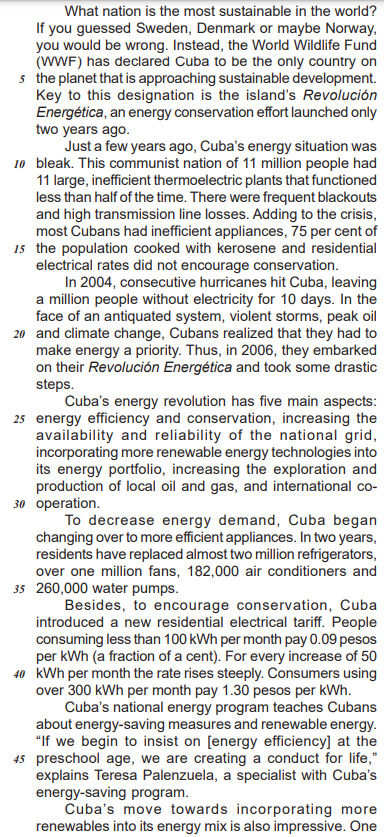Questões de Concurso
Sobre sinônimos | synonyms em inglês
Foram encontradas 1.378 questões

Judge the following items according to the text above.

According to the text above, judge the following items.
management tweaks are nice. But its changes to the
System Tray - aka the Notification Area - have a huge
positive effect.
Changes in Windows 7 transform the System Tray from
an intrusive eyesore (in Windows Vista) into a useful set of
shortcuts and other controls.
In the past, no feature of Windows packed more
frustration per square inch than the System Tray. It quickly grew
dense with applets that users did not want in the first place, and
many of the uninvited guests employed word balloons and
other intrusive methods to alert users to uninteresting facts at
inopportune moments. At their worst, System Tray applets
behaved like belligerent squatters, and Windows did little to put
users [PARTICLE] in charge.
In Windows 7, applets can't pester you unbidden
because software installers can't dump them into the System
Tray. Instead, applets land in a holding pen that appears only
when you click it, a much-improved version of the overflow area
used in previous incarnations of the Tray. Applets in the pen
can't float word balloons at you unless you permit them to do so.
In Windows 7, applets can't pester you unbidden
because software installers can't dump them into the System
Tray. Instead, applets land in a holding pen that appears only
when you click it, a much-improved version of the overflow area
used in previous incarnations of the Tray. Applets in the pen
can't float word balloons at you unless you permit them to do so.
It's a cinch to drag them into the System Tray or out of it again,
so you enjoy complete control over which applets reside there.
More good news: Windows 7 largely dispenses with the
onslaught of word-balloon warnings from the OS about
troubleshooting issues, potential security problems, and the like.
A new area called Action Center - a revamped version of Vista's
Security Center - queues up such alerts so you can deal with
them at your convenience. Action Center does issue
notifications of its own from the System Tray, but you can shut
these off if you don't want them pestering you.
All of this helps make Windows 7 the least distracting,
least intrusive Microsoft OS in a very long time. It's a giant step
forward from the days when Windows thought nothing of
interrupting your work to inform you that it had detected unused
icons on your desktop.
(Adapted from
http://www.pcworld.com/article/172602/windows_7_review.html)
Windows 7 gets the basics right. Here's what you need to know
about the new OS.
Harry McCracken, PC World
Monday, October 19, 2009 2:00 pm
What if a new version of Windows didn't try to dazzle
you? What if, instead, it tried to disappear except when you
needed it? Such an operating system would dispense with glitzy
effects in favor of low-key, useful new features. Rather than
pelting you with alerts, warnings, and requests, it would try to
stay out of your face. And if any bundled applications weren't
essential, it would dump 'em.
It's not a what-if scenario. Windows 7, set to arrive on
new PCs and as a shrinkwrapped upgrade on October 22, has a
minimalist feel and attempts to fix annoyances old and new. In
contrast, Windows Vista offered a flashy new interface, but its
poor performance, compatibility gotchas, and lack of compelling
features made some folks regret upgrading and others refuse to
leave Windows XP.
Windows 7 is hardly flawless. Some features feel
unfinished; others won't realize their potential without heavy
lifting by third parties. And some long-standing annoyances
remain intact. But overall, the final shipping version I test-drove
appears to be the worthy successor to Windows XP that Vista
never was.
(Adapted from
http://www.pcworld.com/article/172602/windows_7_review.html








The connectors “Likewise” (line 44) and “unlike” (line 83) express ideas that are similar to those denoted by
Mark the only option in which the two words ARE NOT synonymous.
A fight breaks out at the low-cost airline
1 ____ There is never a good time to have a full-blown
boardroom brawl in public. But for Sir Stelios Haji-Ioannou,
a flamboyant serial entrepreneur, to have chosen this moment
4 to go to war with his fellow directors at easyJet, a budget
airline, is as puzzling as it is potentially destructive.
The airline industry is reeling from the twin effects
7 of seesawing fuel prices and tumbling demand. Thirty
airlines have already succumbed this year and as many again
are forecast to disappear in 2009. As Europe’s fourth-biggest
10 airline, easyJet, founded by Sir Stelios 13 years ago, will not
be one of them. Its strong balance-sheet, modern fleet and
low-cost operating model mean it is much better placed than
13 most of its competitors to ride out the storm. But it is still
feeling the strain. Sir Stelios, who controls 38% of easyJet,
began his attack on November 13th, arguing that the airline’s
16 plans to expand its fleet during the recession should be
abandoned. He added that easyJet should consider paying a
dividend from 2011, reversing its policy of investing
19 available funds to support the airline’s growth. To this end,
he invoked rights that were established when the company
was floated, by proposing to put two representatives of his
22 holding company, easyGroup, on the board. Sir Stelios hinted
that if the chairman, Sir Colin Chandler, refused to
acquiesce, he would reassume the chairmanship himself, as
25 he is entitled to do. Sir Stelios says he is only calling for a
more cautious approach. Some observers think that his
knowledge of the shipping industry, which is undergoing
28 even greater pain than the airline business, has persuaded him
that this is a time to batten down hatches. Others have
suggested that he needs the promise of a dividend flow to
31 fund his other interests. There has even been some
far-fetched speculation that he may be trying to drive down
easyJet’s share price in order to retake control of it.
34 ___ Whatever his reasons, they spell trouble for easyJet.
The airline’s expansion plans for the coming year are
modest: capacity is planned to grow by 5% compared with
37 the 15% that is easyJet’s norm. Given the desperate state of
Alitalia and the difficulties of Iberia, easyJet, which has hubs
at Milan Malpensa and Madrid Barajas, is in a strong
40 position to benefit. Mr van Klaveren fears that the
ultra-cautious approach Sir Stelios is advocating, combined
with talk of dividends, could result in the stock going
43 “ex-growth” and losing the premium it shares with its rival,
Ryanair. It is hard to see how that is in anyone’s interests.
Internet: <www.economist.com> (adapted).
Judge the following items about the ideas and the linguistic structure of the text above.
The word "puzzling" (l.5) is synonymous with baffling.
This text refers to items from 9 through 20.
Government: stay out of the Economy
1 ____ The current expansion of government intervention
is going to undermine economic growth. Pro or con? Over
the past nine months, government intervention in the
4 economy has spread like a wildfire. From federally mandated
executive compensation rules for companies and job roles
that had nothing to do with the financial meltdown, to the
7 ouster of General Motors (GM) CEO Rick Wagoner at the
behest of the White House, to forcing banks to take and keep
Troubled Asset Relief Program money, Washington’s
10 tentacles are reaching into the minutiae of private business
dealings like never before. Setting aside the long-term
philosophical questions this raises about the role of
13 government in society, one short-term question is whether or
not it will aid recovery. I do not believe it will.
A 1998 Congressional Joint Economic Committee
16 study concluded the optimal size of government to maximize
economic growth was about 18% of gross domestic product
(GDP). Even before today’s unprecedented debt and
19 spending, all levels of government in the U.S. controlled
37% of GDP. Recent federal spending will drive up
government’s share to more than 40%. A single federal
22 health-care plan would gobble up another 16%, putting more
than 50% of the economy in government’s hands.
Economists increasingly understand the Great
25 Depression was prolonged by government intervention in
trade, private industry, and banking. We have evidence from
other countries, too. As Ireland’s tax burden and share of
28 GDP fell, the Celtic Tiger roared. Recent National Bureau of
Economic Research findings show that Jamaica’s pursuit of
“social justice” policies has retarded its growth compared
31 with its less interventionist sister island, Barbados. From
1960 to 2002, Barbados’ per capita GDP doubled, but
Jamaica’s grew only 50%.
34 ___ Government has an important and legitimate role to
play in a growing economy. It should enforce contracts,
create a level playing field for all businesses, and steadfastly
37 promote the rule of law. U.S. entrepreneurs can take it from
there.
Internet: <www.businessweek.com> (adapted).
In the text,
"gobble" (l.22) is synonymous with swallow.
This text refers to items from 9 through 20.
Government: stay out of the Economy
1 ____ The current expansion of government intervention
is going to undermine economic growth. Pro or con? Over
the past nine months, government intervention in the
4 economy has spread like a wildfire. From federally mandated
executive compensation rules for companies and job roles
that had nothing to do with the financial meltdown, to the
7 ouster of General Motors (GM) CEO Rick Wagoner at the
behest of the White House, to forcing banks to take and keep
Troubled Asset Relief Program money, Washington’s
10 tentacles are reaching into the minutiae of private business
dealings like never before. Setting aside the long-term
philosophical questions this raises about the role of
13 government in society, one short-term question is whether or
not it will aid recovery. I do not believe it will.
A 1998 Congressional Joint Economic Committee
16 study concluded the optimal size of government to maximize
economic growth was about 18% of gross domestic product
(GDP). Even before today’s unprecedented debt and
19 spending, all levels of government in the U.S. controlled
37% of GDP. Recent federal spending will drive up
government’s share to more than 40%. A single federal
22 health-care plan would gobble up another 16%, putting more
than 50% of the economy in government’s hands.
Economists increasingly understand the Great
25 Depression was prolonged by government intervention in
trade, private industry, and banking. We have evidence from
other countries, too. As Ireland’s tax burden and share of
28 GDP fell, the Celtic Tiger roared. Recent National Bureau of
Economic Research findings show that Jamaica’s pursuit of
“social justice” policies has retarded its growth compared
31 with its less interventionist sister island, Barbados. From
1960 to 2002, Barbados’ per capita GDP doubled, but
Jamaica’s grew only 50%.
34 ___ Government has an important and legitimate role to
play in a growing economy. It should enforce contracts,
create a level playing field for all businesses, and steadfastly
37 promote the rule of law. U.S. entrepreneurs can take it from
there.
Internet: <www.businessweek.com> (adapted).
In the text,
"undermine" (l.2) is the same as reinforce.
Viva La Revolución Energética
Laurie Guevara-Stone Courtesy Mario Alberto Arriastía Avila
Alternatives Journal 34:6 2008


Mark the only option that contains a pair of synonyms.
Viva La Revolución Energética
Laurie Guevara-Stone Courtesy Mario Alberto Arriastía Avila
Alternatives Journal 34:6 2008


In the fragment “Besides, to encourage conservation, Cuba introduced a new residential electrical tariff.” (lines 36-37), besides can be substituted by





